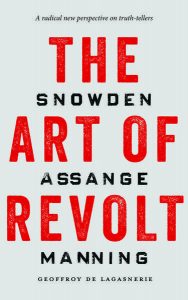(THIS ARTICLE IS MACHINE TRANSLATED by Google from Norwegian)
Recently, Harvard University would award whistle blower Chelsea Manning an honorary title. However, this was immediately withdrawn when the head of the CIA, Mike Pompeo, subsequently canceled a speech he was to hold at the prestigious university. He would not dream of putting his legs somewhere that would recognize a state enemy.
The miser is an example of whistleblowers such as Manning, Edward Snowden and Julian Assange being regarded as enemies of the state – as cowards and traitors. And according to French philosopher Geoffroy de Lagasnerie, whose book The Art of Revolt Just published in English, there are some very specific reasons for this attitude.
Innovations. The fierce opposition of governments to the three persons mentioned, and groups such as the hackers in Anonymous, is because they represent a marked change in the way political resistance can be embodied. The trio is doing something completely new that the existing structures can neither comprehend nor handle. Their lives are their resistance, and they invite us to create completely different relations to the law, to the nation, to citizenship, and not least to politics.
The Art of Revolt can almost be seen as an intellectual ode to Snowden, Assange and Manning. Not understood in such a way that the Lagasnerie necessarily agree with their actions, but he clearly has a deeply preoccupied view that their approach is so radical that we should rethink the notion of resistance.
 The inherent censorship of democracy. The author argues that traditional terms such as whistleblower og civil disobedience not at all comprehensive for people like the three mentioned. These terms contain a notion of resistance that occurs within existing paradigms, where one may oppose something, but where this occurs within the established structures, which are thus recognized and accepted simultaneously with the resistance. Normal resistance is rooted in the notion that the opponent is one subjekt which is part of a relationship with the body in question – for example, the state – and thus subject to some logic which is part of what must be criticized. Thus, democracy holds some inherently undemocratic elements, says the analysis of the author.
The inherent censorship of democracy. The author argues that traditional terms such as whistleblower og civil disobedience not at all comprehensive for people like the three mentioned. These terms contain a notion of resistance that occurs within existing paradigms, where one may oppose something, but where this occurs within the established structures, which are thus recognized and accepted simultaneously with the resistance. Normal resistance is rooted in the notion that the opponent is one subjekt which is part of a relationship with the body in question – for example, the state – and thus subject to some logic which is part of what must be criticized. Thus, democracy holds some inherently undemocratic elements, says the analysis of the author.
The new resistance is significant in that the subject does not stand out clearly, but is blurred by the use of anonymity (Manning, Wikileaks and Anonymous) or by exile / migration (Snowden, Assange). Anonymity is not intended to escape punishment, but to enter into a political practice that is not required by a relationship with it or with criticism.
The new resistance is significant in that the practitioner does not show up clearly, but is obscured through anonymity or exile.
This also allows individuals who are affiliated with an institution such as the NSA or the US military to mobilize political action against the same institution. The opposition people thus speak from the inside as well as from the outside, which weakens the institutions and thus challenges the relationship that Foucault has called subjugation ( "Subjugation").
New voices can protest, including voices that would not normally do so (under the old conditions). Thus, protests can arise from new places without necessarily knowing where they come from. According to the Lagasnerie, this new form of resistance has shown us that democracy actually has some inherent censorship problems, as not all individuals dare to resist if it requires a subject relationship to the situation to be criticized.
New political scene. Snowden and Assange do not cover themselves under anonymity but, as part of their resistance, operate in exile, emigrating. In doing so, they also challenge common notions of the rule of law, affiliation and relations with the territorial. The political scene moves and a new form of political involvement emerges. This is no longer tied to the notion of a bourgeois public in the Habermasian sense, where one must precisely step forward and enter into a subject relationship with the nation being criticized. For why should an individual who would like to expose something critical but does not have a responsibility for this criticism, assume a responsibility simply to establish the criticism? Snowden and Assange practice democracy by exile, leaving the nation and democracy of which they no longer wish to be a compulsory member. And with just exile, rejection of the nation and the use of digital communities, there is at the same time a resistance that is bound up in far more volatile and heterogeneous groups than the traditional form of resistance.
The Art of Revolt is a thought-provoking working document. Locally, the book bears the hallmark of being an introductory sketch of how we can comprehend the new ways of exercising resistance. Arguments do not come to an end and there is no chromed perspective or clear conclusion. However, there is also a strength in this, because we as readers are thus invited to think with the Lagasnerie and together mobilize a vocabulary that can be symbiotic with the new forms of resistance.


